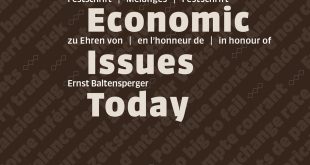Panel discussion with Ernst Baltensperger, Otmar Issing, Fritz Zurbrügg and Mark Dittli (moderator) on the occasion of the publication of the Festschrift in honour of Ernst Baltensperger, Bern, June 16, 2017. SNB press release. Video (SNB Forschungs-TV).
Read More »“Die Vollgeld-Initiative und eine Alternative (The Swiss Sovereign Money Initiative, and an Alternative),” SNB, 2017
In: Thomas Moser, Carlos Lenz, Marcel Savioz and Dirk Niepelt, editorial committee, Monetary Economic Issues Today, Festschrift in Honour of Ernst Baltensperger, Swiss National Bank/Orell Füssli, Zürich, June 2017. PDF of draft. The sovereign money initiative (Vollgeldinitiative) seeks to gain greater control over the money and credit supply, to increase financial stability and to achieve a fairer distribution of seigniorage income. The initiative’s suggested approach – a ban on active...
Read More »“Monetary Economic Issues Today,” Orell Füssli, 2017
Festschrift in Honour of Ernst Baltensperger, Swiss National Bank/Orell Füssli, Zürich, June 2017, with Thomas Moser, Carlos Lenz, and Marcel Savioz, editorial committee. Publisher’s website. From the publisher’s website: »Eine Welt ohne ein gut funktionierendes Zahlungssystem, ohne Geld- und andere Wertaufbewahrungsanlagen, ohne zuverlässige Recheneinheit, das wäre eine Welt mit einem viel tieferen Wohlstandsniveau,in der wir nicht mehr leben möchten.« Ernst Baltensperger Ursachen und...
Read More »Money and Credit in Germany
In its April 2017 Quarterly Report, the Deutsche Bundesbank discusses the role of banks in the creation of money. Findings from a wavelet analysis indicate that in Germany, money and credit move in parallel in the long run. In an appendix, the report mentions possible welfare costs of curbing maturity transformation, with reference to Diamond and Dybvig’s work. This is not convincing. Unlike in the typical (microeconomic) banking model, aggregate central bank provided money need not be...
Read More »Does Greece Need Official Debt Relief?
In a Peterson Institute working paper, Jeromin Zettelmeyer, Eike Kreplin, and Ugo Panizza conclude that the answer to that question depends on your assumptions. The authors compare several scenarios, including scenarios A–C, the baseline scenario of the European institutions and two more pessimistic variants; scenario I which underlies the IMF reasoning and which assumes that “Greece will not undertake the structural reforms needed to achieve higher potential growth”; and scenario D,...
Read More »John Cochrane and Janet Yellen
On his blog, John Cochrane discusses the possibility of an alternative monetary policy regime in which the Fed tightly controls expected inflation. He states, repeatedly, that given our current understanding of the matter he would refrain from implementing such a regime if he became Fed chair (rather than stating that he would not currently advise to move in that direction). Given that Janet Yellen is expected to retire next year and John Cochrane is mentioned as a possible successor, I...
Read More »“Should Central Banks Fear the Blockchain?,” European Financial Review, 2017
The European Financial Review, February-March 2017. HTML, PDF. See the VoxEU article.
Read More »Money, Banking, and Dreams
In another excellent post on Moneyness, J P Koning likens the monetary system to the plot in the movie Inception, featuring a dream piled on a dream piled on a dream piled on a dream. Koning explains that [l]ike Inception, our monetary system is a layer upon a layer upon a layer. Anyone who withdraws cash at an ATM is ‘kicking’ back into the underlying central bank layer from the banking layer; depositing cash is like sedating oneself back into the overlying banking layer. Monetary...
Read More »Economics as Bullshit Detection
In separate blog posts, Russ Roberts and John Cochrane have called for humility on the part of economists. Asking “What do economists know?,” Roberts and Cochrane point out—correctly—that economics is not as strong on quantification as some economists and many pseudo economists pretend, and as is often expected from economists. Economics is not the same as applied statistics although the latter can help clarify, at least to some extent, the empirical relevance of economic theories....
Read More »Vollgeld, the Blockchain, and the Future of the Monetary System
Presentation at the Liechtenstein Institute about the Vollgeld initiative, the blockchain revolution, and their possible effects on banks and the monetary system. Report in Liechtensteiner Vaterland, February 1, 2017. HTML. Interview in Wirtschaft Regional, February 4, 2017. PDF.
Read More » Swiss Economicblogs.org
Swiss Economicblogs.org

